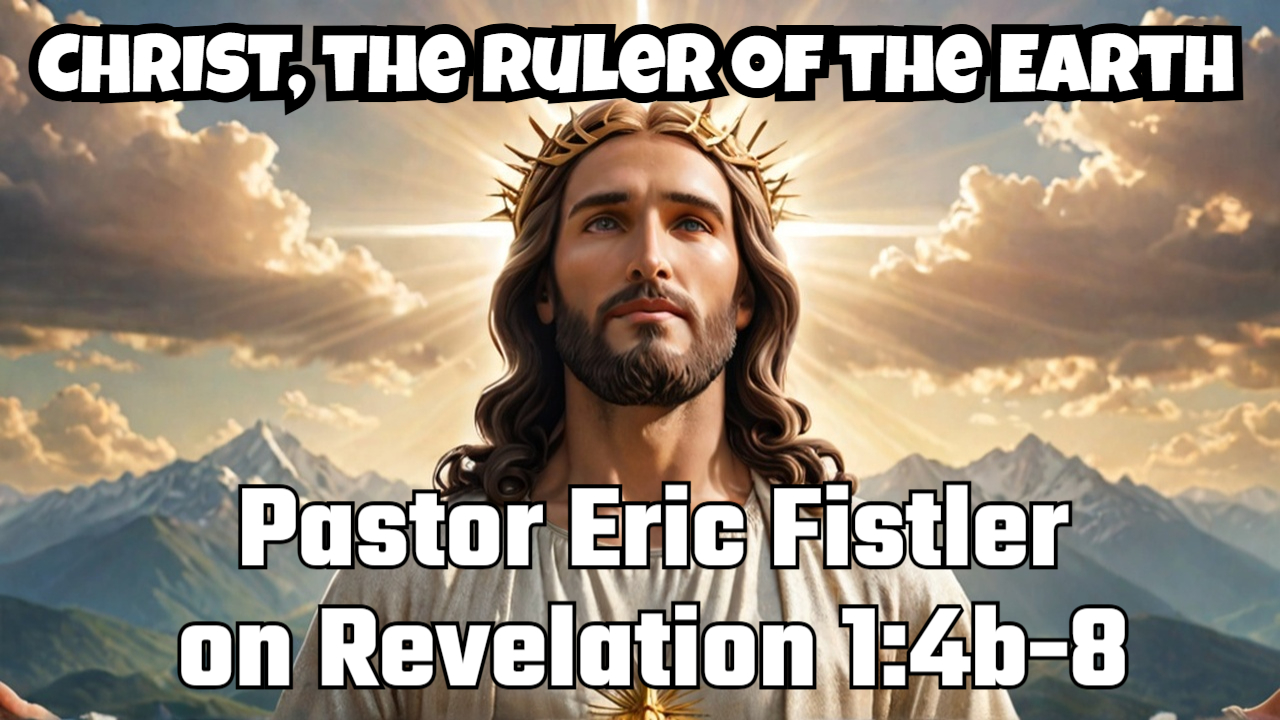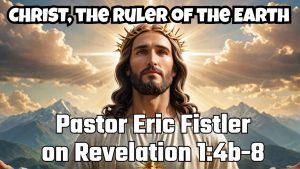Dave: I’m thinking we should move on to the second reading which is, for this Christ the King Sunday, a reading from Revelation, chapter one.
We’ve got Pastor Eric Fistler to share some thoughts o,n it. If you don’t know Pastor Eric that’s because you’re not listening to the Pulpit Fiction podcast. It’s a a podcast I’ve been listening to every week for about as long as I can remember, and Rob McCoy and Pastor Eric co-host that together and they’re great men, I think, and, between them, they have extraordinary insights into the Scripture, and I’ve been doing little guest spots as the “Voice in the Wilderness” there for the last 12 months, I think, and I asked Eric if he would return the favor, and here he is
Eric: I am a United Church of Christ Pastor out here on the shining shores of Crystal Lake, Illinois, which is about an hour and a half Northwest outside of Chicago, Illinois. I’m also one of the co-hosts of the Pulpit Fiction podcast– the lectionary podcast for Preachers, Seekers and Bible Geeks, and it has been an absolute joy through Pulpit Fiction to get to know Father Dave, and even better to be here with you today, to talk a little bit about Revelation chapter 1, verse 4 through 8.
I have to say, Revelation has to be one of my favorite books of Scripture, not because I always turn to it for a verse here and a verse there, although times I do, but because it’s one of those books that just almost get stuck in your craw because it’s so weird, it’s so out of touch, it seems so strange and different from everything, it has such deep symbolism and it sparks the imagination, both with wild hopes and also deep fears and violent imagery!
It was something as a kid I remember turning to because what other book in scripture will talk about dragons and rivers of blood up to the bridles of horses, and The Four Horsemen of the Apocalypse, but also, as I said, I think it’s one of the most misunderstood books. It’s one that can cause us to shy away, but I think actually today, on this Christ the King Sunday, it should actually be drawing us deeper in, and I think it comes down to the kind of scripture and kind of literature that it is. This is a book of apocalyptic literature – the Apocalypse.
Now, if you Google ‘Apocalypse’, it’s going to tell you everything about, you know, this is the end of days. It’s ‘doomsday’ it’s ‘the countdown’ and all of those different things, but ‘apocalypse’ actually doesn’t mean that. Apocalypse means an ‘unveiling’, and we have another apocalyptic book, in fact in today’s scripture, verse 7, called back to it. It’s actually an echo of Daniel, our other apocalyptic book, that comes to us from the Hebrew Bible, and whether we’re looking at Revelation or we’re looking at the ‘little Apocalypse’ in Mark 13, or we’re looking at the Book of Daniel, in all of these circumstances these are not necessarily predictions of horrible things that are to come but rather they are imagery and symbolism of some of the awfulness that is being experienced in that moment in that time.
Of course, for Daniel, it was Jews struggling in the horrors of the Babylonian exile, who were constantly being threatened with assimilation and the destruction of the entire Jewish culture and religion as they knew it, and so, what did it mean to be faithful in this time when the Babylonian culture and those in power were trying so hard to bend the Jewish people to their will and to break who they were?
Of course, then we come ahead to Revelation, in Revelation too we find those earliest followers of the way that are persecuted not only from without in the Roman Empire, but also within their own communities, many of whom were Jewish followers of the way of Jesus as these communities themselves were fracturing, not only the strain of Roman occupation but also of the strains within in. In both of these circumstances, apocalyptic literature comes to those who look at the world and see and acknowledge it’s not the way it should be, and I don’t know about you, but I look at the world and I often feel the same way.
I’m here in the United States and, earlier this month, we had an election, and it didn’t matter who you voted for in the election either way nobody was satisfied. Nobody was happy. People were either unhappy because their candidate lost, or they voted for another candidate because they didn’t like the way that the world was and they thought that candidate was going to fix it, and while we can debate the politics until the cows come home, friends, we can agree that things just aren’t right.
Whether we agree with one political party or another political party, or one policy or another policy, we can agree that these deep divisions that are happening around our world that are dividing churches and communities and nations and families and loved ones is not what God intends. And so, again, I’m drawn back to this image of apocalypse, which doesn’t mean the end of days but which means literally that ‘uncovering’ that ‘unveiling’ that ‘revealing’ that ‘revelation’, and when I think of that in today’s Scripture as we come to ‘Christ the King Sunday’ and what does it mean to proclaim the reign of Christ and that Christ is King – Alpha and Omega – I’m reminded of three things that we hear not only in today’s reading but in all apocalyptic literature.
The first is, no matter how bad it may seem, no matter how dark and long the valley is, God is with us. And there’s nothing that can change that there’s nowhere we can flee from God’s presence and we cannot flee either because we don’t want to be around God because we’re angry with God or because we don’t want God to see the inner workings of our hearts or what we say to each other or sometimes the horrible things that we do to each other. God is always with us, and always within us – that loving voice of Eternal Grace, call calling us back.
We also have the message that this is not the end. I’m reminded of the great prophet, John Lennon, who is accredited with saying “in the end everything will be okay, so if it’s not okay, friends, it’s not the end”, and apocalyptic literature, including our Revelation, agrees with that. There’s going to be a lot of terrible and scary things ahead but it’s not the end. The end is more beautiful than we could ever possibly imagine – greater than the eye has seen, or human imagination has envisioned.
But perhaps the most important thing that is revealed or uncovered is what will we do as we walk through the valley of darkness. What do we do in the midst of the Valley of the shadow of death? What do we do when we feel like the world is falling apart? What does the apocalypse reveal about us as Believers? Will we give way to our worst most violent and angry passions of division and jealousy of spite of conquering dualism, or will we listen to our better angels? Will we trust in the one who is the Alpha and the Omega, the beginning and the end – the one who was, who is, and is to come. Will we turn away from division and hatred and anger and toward love? Will we remember those words that Jesus said in the midst of his valley of the shadow of death, when he knew that he would be betrayed, and he knew how angry and hurt his disciples would be and he told them, “love one another, as I have loved you.”
The question is up to us as we come today to this wonderful passage from Revelation. What will this day and this time reveal for us and for our communities of Faith?
Friends, it’s been so good to be with you. It’s been wonderful to be here, and greetings again to Father Dave and to everyone there. You can find more stuff from Pulpit Fiction at www.PulpitFiction.com. I wish you all a very blessed Christ the King Sunday.
First broadcast on The Sunday Eucharist on November 24th, 2024
Connect with Pastor Eric Fistler at www.PulpitFiction com

